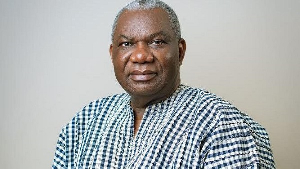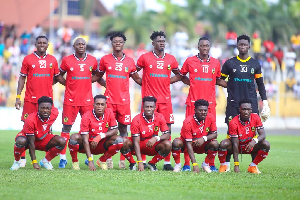...It?s all About Recruiting, Leadership and Attitude.
It is believed that at this point, the problems of Ghana Airways has been discussed enough. A new chapter is being written for the carrier and hopefully there should be success for all the parties involved.
The sad part about the possible way forward, as mentioned in many media circles, would reaffirm an unspoken position that as Africans, we are not capable of running our businesses, especially those of international caliber. That would be wrong since there is evidence to the contrary, in Ghana and elsewhere on the continent that this position is more perception than real. However perception is powerful.
It is worthy for all the parties involved in the operation of Ghana Airways, right up to this point, and all individuals and organizations, currently on shaky ground, to take cue from the article, titled ?Alitalia Deal Crosses Last Hurdle?, featured on the BBC website, http://news.bbc.co.uk/2/hi/business/3664842.stm.
There are a few points to be made with respect to Alitalia. There is some similarity in terms of ownership structure of the airline. It also has debt and is struggling operationally.
What is really important is the effort, organizations such as Alitalia, go through to safeguard their businesses, be it operational difficulties due to the foreseen or unforeseen. An appreciable tenacity in terms of approach to march forward with an agenda to create solutions, which of course could mean hardships for some, but most importantly, fundamental positions not to allow for the organization to totally collapse so all jobs are lost. An approach that is wanting in our environment but needs to be.
Nothing comes easy. Alitalia at one time recently was approached for some sort of relief for our Ghana Airways. How? As a struggling company, they were dealing with their own issues, within the confines of their company, country and region.
Obviously one is not na?ve to assume that prudent operational management put Alitalia where it is now. However, they acknowledge where they are and are taking steps, as far reaching as they can, to fix the problem without the added burden of affecting related industry and national image.
This brings us to our Ghanaian leadership. We have very capable individuals, of Ghanaian origin, and as has been expressed in some previous articles, we owe it to ourselves as a nation, to secure especially local talent, that has been tested and must take such candidates through the process that most international search firms use to secure talent. Actually farm this process out to reputable search firms.
We cannot let politics, assume or consume every aspect of our lives, as there is a place for politics, and there is a place for intellectuals, technocrats, and business leaders in our economy. We need to be able to reach out to people, of Ghanaian background, who simply have expertise to do the job right from the onset, without politics. We do not have to get people of questionable character and credentials to lead our organizations, only to turn around and blame them for our woes. That is simply setting up one to fail, but unfortunately, as they go down, they take a lot with them along the way.
We also have to address the issue of compensation as a matter of urgency. If we offer our expatriate staff the money we do, and do not even offer a reasonable proportion of such compensation to our Ghanaians, of the same caliber, either local or from the Diaspora, in essence, we are telling our own kind that they are not on the same level as their expatriate counterparts. It is that simple. They do the jobs with the same expectation in terms of risk so why not the relative equity in compensation?
We have Ghanaians who would actually for the love of the country compromise, in terms of compensation, and offer their services at a much-reduced rate than these expats, who still have difficulty in terms of operation, when they are in charge.
The only reason I can see why we still follow the model cited above, in terms of inequitable incomes between expats and locals, and why this is still fashionable, is because we reach this point, where we have been unable to successfully run our business, and as they are on the verge of collapse, we are desperate, since on their own merit, such organizations cannot secure the capital, or credit facilities, from the open capital markets needed to run the organization. As such, we either get these expats as conditionality, or as a way to reach the badly needed capital, which we need to keep the businesses afloat. Even though this analysis is speculative, it serves as the only reason that can be rationalized as to why this practice still continues and is justified.
Going back to the article cited above, it is evident that others have problems, sometimes bigger than ours, such as Alitalia vs. Ghana Airways. However, how we deal with ours is what makes it troubling. How the leadership pursues the problems raises concerns. We are not swift and decisive, and of course this comes from weak leadership. The sense of urgency is much lacking, always in all fronts irrespective of issue.
In terms of seeking qualified local leaders, we need to make sure that the reward, in terms of leading a company or for that matter, any organization of importance, in Ghana measures up to at least the best of standards, in terms of compensation, with our regional peers. Right before our eyes, we see what the multi-nationals do in our own country, or continent, to retain top local executives. They know what these folks are worth and get value for money. On the other hand, we also see where low paid leaders, ?unofficially? narrow the gap, between what they might see as equitable income and real income (official pay), through corruption.
The argument for us to pursue Ghanaians first, who have the credentials and the track record, for leadership positions, is that in terms of local context issues, and cultural norms, together with technical expertise, they can produce better results than that delivered by imported human capital, which has equal technical expertise, without the necessary local values cited. As such, we owe it to ourselves, to see the need for talent, well paid, to protect our jobs and economy in the long run.
From the attitude viewpoint, we cannot have this idea or suspicion that all people doing well, who lead organizations, and are paid well, are exploiting workers.
For this not to happen, our labor organizations must understand this relationship between risk and reward, the importance of quality leadership at a price, and must not use executive compensation to inflame the wrong passions, when it is convenient, but rather realize that, all the fingers on the hand are not the same. They work together to create the movement required by the hand but are not equal in shape, size etc.
Leaders have made investments in themselves that exceed that of the floor worker, and most importantly their compensation must reflect the risk, responsibilities and accountability associated with the successful peformance of their job. If poorly managed, more people associated with the organization pay a price, and as such the level of compensation must be tied to measurable performance results.
In addressing our leadership issues, which really are becoming glaring, let us not wait for problems to occur before we dissolve boards, as we are doing now. Get them out before they compromise themselves and their organizations.
Ghana simply cannot waste anytime on self-centered people who do not understand their job descriptions.
Being proactive starts with the recruiting process. Hiring the right individuals with superb leadership skills will save us all the pain and inconvenience associated with disrupted services or operational difficulties of poorly run organizations and institutions.
It also gives us, as a nation, a better chance at the possibility of having the type of institutions that will collectively make our ?Golden Age of Business? a success.



















